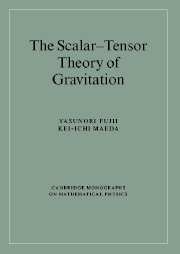Book contents
- Frontmatter
- Contents
- Preface
- Conventions and notation
- 1 Introduction
- 2 The Prototype Brans–Dicke model
- 3 Conformal transformation
- 4 Cosmology with Λ
- 5 Models of an accelerating universe
- 6 Quantum effects
- Appendix A The scalar field from Kaluza-Klein theory
- Appendix B The curvature scalar from the assumed two-sheeted space-time
- Appendix C The field equation of gravity in the presence of nonminimal coupling
- Appendix D The law of conservation of matter
- Appendix E Eddington's parameters
- Appendix F Conformal transformation of a spinor field
- Appendix G Conformal transformation of the curvature scalar
- Appendix H A special choice for conformal invariance
- Appendix J The matter energy–momentum nonconservation law in the E frame
- Appendix K A modification to the Λ term
- Appendix L Einstein's equation in the brane world
- Appendix M Dilatation current
- Appendix N Loop integrals in continuous dimensions
- Appendix O A conformal frame in which particle masses are finally constant
- References
- Index
1 - Introduction
Published online by Cambridge University Press: 24 August 2009
- Frontmatter
- Contents
- Preface
- Conventions and notation
- 1 Introduction
- 2 The Prototype Brans–Dicke model
- 3 Conformal transformation
- 4 Cosmology with Λ
- 5 Models of an accelerating universe
- 6 Quantum effects
- Appendix A The scalar field from Kaluza-Klein theory
- Appendix B The curvature scalar from the assumed two-sheeted space-time
- Appendix C The field equation of gravity in the presence of nonminimal coupling
- Appendix D The law of conservation of matter
- Appendix E Eddington's parameters
- Appendix F Conformal transformation of a spinor field
- Appendix G Conformal transformation of the curvature scalar
- Appendix H A special choice for conformal invariance
- Appendix J The matter energy–momentum nonconservation law in the E frame
- Appendix K A modification to the Λ term
- Appendix L Einstein's equation in the brane world
- Appendix M Dilatation current
- Appendix N Loop integrals in continuous dimensions
- Appendix O A conformal frame in which particle masses are finally constant
- References
- Index
Summary
We begin this chapter with an overview in section 1 of how the scalar–tensor theory was conceived, how it has evolved, and also what issues we are going to discuss from the point of view of such cosmological subjects as the cosmological constant and time-variability of coupling constants. In section 2 we provide a simplified view of fundamental theories which are supposed to lie behind the scalar–tensor theory. Section 3 includes comments expected to be useful for a better understanding of the whole subject. This section will also summarize briefly what we have achieved.
In section 1 we emphasize that the scalar field in what is qualified to be called the scalar–tensor theory is not simply added to the tensor gravitational field, but comes into play through the nonminimal coupling term, which was invented by P. Jordan. Subsequently, however, a version that we call the prototype Brans–Dicke (BD) model has played the most influential role up to the present time. We also explain the notation and the system of units to be used in this book.
The list of the fundamental ideas sketched in section 2 includes the Kaluza–Klein (KK) theory, string theory, brane theory as the latest out-growth of string theory, and a conjecture on two-sheeted space-time.
- Type
- Chapter
- Information
- The Scalar-Tensor Theory of Gravitation , pp. 1 - 36Publisher: Cambridge University PressPrint publication year: 2003

